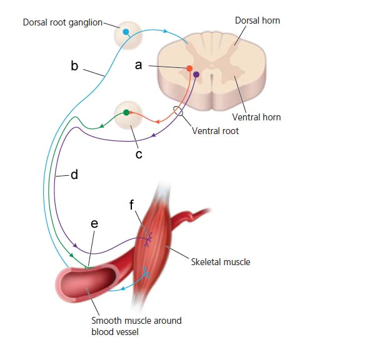Exam 9: Regulating Vital Bodily Functions
Exam 1: Nervous System Organization75 Questions
Exam 2: Computing With Neurons81 Questions
Exam 3: Neuronal Plasticity64 Questions
Exam 4: Developing a Nervous System61 Questions
Exam 5: Protecting and Maintaining the Adult Nervous System66 Questions
Exam 6: Sensors I: Remote Sensing60 Questions
Exam 7: Sensors II: Sensing on Contact64 Questions
Exam 8: Using Muscles and Glands65 Questions
Exam 9: Regulating Vital Bodily Functions64 Questions
Exam 10: Controlling Posture and Locomotion75 Questions
Exam 11: Localizing Stimuli and Orienting in Space78 Questions
Exam 12: Identifying Stimuli and Stimulus Objects68 Questions
Exam 13: Regulating Brain States67 Questions
Exam 14: Remembering Relationships58 Questions
Exam 15: Selecting Actions, Pursuing Goals62 Questions
Exam 16: Being Different From Others60 Questions
Select questions type
Which of the following is true of the sympathetic branch of the autonomic nervous system?
(Multiple Choice)
5.0/5  (29)
(29)
Comparing the regulation of our bodies' internal temperature to the regulation of temperature in a classroom, what would be an appropriate description of what happens when body temperature gets too high?
(Multiple Choice)
4.9/5  (40)
(40)
A trauma to which of the following brain regions would result in the most severe increase in thirst and water intake?
(Multiple Choice)
5.0/5  (38)
(38)
A patient that has suffered a major spinal cord injury between the T1 and L3 segment of their spinal column might experience which of the following symptoms?
(Multiple Choice)
4.9/5  (33)
(33)
Predict what might be some consequences of mutated or reduced numbers of leptin receptors in the hypothalamus.
(Multiple Choice)
4.7/5  (39)
(39)
Axons of the parasympathetic preganglionic neurons may exit the brain via which of the following cranial nerves?
(Multiple Choice)
4.8/5  (34)
(34)
 Match each term with its appropriate location (a-f) in the diagram above)
Use the diagram above to Answer the following questions .
-_____Motor neuron axon
Match each term with its appropriate location (a-f) in the diagram above)
Use the diagram above to Answer the following questions .
-_____Motor neuron axon
(Short Answer)
5.0/5  (30)
(30)
Which of the following provide stimuli to vagal afferent neurons?
(Multiple Choice)
4.9/5  (40)
(40)
The freeze response is physiologically different than the fight or flight response) You would expect an animal experiencing a freeze response to a predator to have a ___________blood pressure than when in a flee response)
(Short Answer)
4.7/5  (40)
(40)
Match the times below with the peptide hormone you would expect to be the highest in concentration in the blood
-_______________immediately before eating breakfast in the morning
(Multiple Choice)
4.8/5  (29)
(29)
 Match each term with its appropriate location (a-f) in the diagram above)
Use the diagram above to Answer the following questions .
-The neurotransmitter released from the postganglionic neurons labeled e above is _______________.
Match each term with its appropriate location (a-f) in the diagram above)
Use the diagram above to Answer the following questions .
-The neurotransmitter released from the postganglionic neurons labeled e above is _______________.
(Short Answer)
4.8/5  (36)
(36)
The binding of the neurotransmitter released in f. might result in which of the following?
(Multiple Choice)
4.9/5  (30)
(30)
Which of the following stimuli would elicit an increase in heart rate and blood pressure?
(Multiple Choice)
4.9/5  (43)
(43)
If a patient with diabetes insipidus were to be misdiagnosed with diabetes mellitus, what would you expect to be some of the symptoms of them being treated with the wrong pharmaceutical intervention?
(Short Answer)
4.7/5  (39)
(39)
Predict what would happen if someone is exposed to a drug that artificially bound oxygen in the blood).
(Multiple Choice)
4.8/5  (33)
(33)
Regulation of blood glucose is under the control of hormones that affect glucose storage and breakdown. What might be the result of a drug that inhibits glucagon secretion from the pancreas?
(Multiple Choice)
4.8/5  (43)
(43)
 Match each term with its appropriate location (a-f) in the diagram above)
Use the diagram above to Answer the following questions .
-_____Intermediolateral column
Match each term with its appropriate location (a-f) in the diagram above)
Use the diagram above to Answer the following questions .
-_____Intermediolateral column
(Short Answer)
4.7/5  (42)
(42)
Explain in your own words how non-steroidal anti-inflammatory drugs reduce fevers. What could be the positive and negative effects of taking such drugs in terms of body temperature and fighting off pathogens?
(Essay)
4.8/5  (39)
(39)
Which of the following would be true of a person who had been diagnosed with diabetes insipidus?
(Multiple Choice)
4.9/5  (34)
(34)
Describe three physiological processes that are regulated in fundamentally opposing ways by the sympathetic and parasympathetic divisions of the nervous system.
(Essay)
4.7/5  (26)
(26)
Showing 41 - 60 of 64
Filters
- Essay(0)
- Multiple Choice(0)
- Short Answer(0)
- True False(0)
- Matching(0)